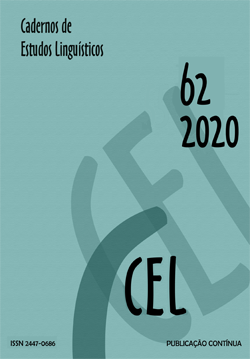Abstract
The article discusses some aspects of the interaction between tense and modality in the interpretation of modal verbs in Portuguese. It is argued that the complement of all modal verbs can host a future operator that is pronounced as a suffix attached to the verb. It is also argued that the complement of epistemic modals hosts a tense head (present or past) which is raised to the main clause and also pronounced as an affix on the verb. Non-finite complements of epistemic modals are contrasted with non-finite complements of verbs of attitude, which do not instantiate a referential tense or allow temporal raising, resulting in a more transparent morpho-semantic profile.
References
ABUSCH, D. (1998) Generalizaing tense semantics for future contexts. In Rothstein, S., editor, Events and Grammar, pp. 13-33. Kluwer, Dordrecht.
CINQUE, G. (1999) Adverbs and Functional Heads. Oxford University Press, Oxford.
CONDORAVDI, C. (2002) Temporal interpretation of modals: Modals for the present and for the past. In Beaver, D., Kaufmann, S., Clark, B., & Casillas, L., editores, The Construction of Meaning, pp. 59-88. CSLI Publications, Stanford, CA.
FERREIRA, M. (2018) Estudos Formais sobre a Semântica Nominal e Verbal do Português. Tese de Livre-Docência. Universidade de São Paulo.
VON FINTEL, K. e GILLES, A. (2008) CIA Leaks. Philosophical Review 117, 77-98.
HACQUARD, V. (2006) Aspects of modality. Tese de Doutorado, Massachusetts Institute of Technology.
HEIM, I. (1994) Comments on Abusch's theory of tense. In Kamp, H., editor, Ellipsis, Tense, and Questions, pp. 143-170. University of Amsterdam, Amsterdam.
HOFFMAN, T. (1976). Past tense replacement and the modal system. In McCawley, J., editor, Notes from the Linguistic Underground, pp. 85-100. Academic Press, New York.
KLEIN, W. (1994). Time in language. Routledge, London; New York.
KRATZER, A. (1981). The notional category of modality. In Eikmeyer, H. & Rieser, H., editores, Words, Worlds, and Contexts: New Approaches in Word Semantics, pp. 38-74. de Gruyter, Berlin.
KRATZER, A. (1991). Modality. In von Stechow, A. & Wunderlich, D., editores, Semantics: An International Handbook of Contemporary Research, pp. 639-650. de Gruyter, Berlin.
KRATZER, A. (1998). More structural analogies between pronouns and tenses. In Proceedings of SALT VIII, pp. 92-110. CLC Publications.
KRATZER, A.; PIRES DE OLIVEIRA, R.; PESSOTTO, A. (2014) Talking about modality – an interview with Angelika Kratzer. ReVEL, especial issue 8.
LACA, B. (2010) On Modal Tenses and Tensed Modals. Paris. Université Paris 8/CNRS, Ms.
MENDES, J. (2019). Interações Modal-temporais no português brasileiro. Dissertação de Mestrado. Universidade de São Paulo
PARTEE, B. (1973). Some structural analogies between tenses and pronouns in English. Journal of Philosophy, 70: 601-609.
PESSOTTO, A. (2014) Epistemic and gradable modality in Brazilian Portuguese: a comparative analysis of poder, dever and ter que. ReVEL, special issue 8.
RULLMAN, H. e MATTHEWSON, L. (2018) Towards a theory of modal-temporal interaction. Language 94.2, pp. 281-331
STOWELL, T. (2004) Tense and modals. In Guéron, J. & Lecarme, J., editores, The Syntax of Time, pp. 621--635. MIT Press, Cambridge, MA.
WURMBRAND, S. (2014) Tense and aspect in English infinitives. Linguistic Inquiry, 45(3):403-447.

This work is licensed under a Creative Commons Attribution-NonCommercial 4.0 International License.
Copyright (c) 2020 Cadernos de Estudos Linguísticos


